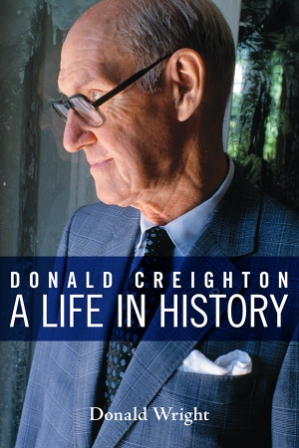I first "met" Donald Creighton when, as an undergraduate, I was assigned a couple of chapters from his two-volume biography of Sir John A. Macdonald. Instantly hooked by his ability to transport readers back in time, I knew that I was in the presence of someone pretty special. As a graduate student at McGill and Ottawa, I continued to read his books not for what he wrote, but for how he wrote it, because by then I also knew that on most subjects he was out to lunch.
A subject on which he was especially out to lunch was Quebec and in 1995 I gave my first paper at the annual meeting of the Canadian Historical Association entitled "Donald Creighton and the French Fact." It meant re-reading his books, of course. But it also meant spending a long, hot summer in the reading room of what was then the National Archives where his personal papers revealed a very different man: angry, yes, and self-pitying, but also generous, sensitive, and funny. I remember one letter in particular. In a lengthy exchange with a close friend, Creighton confessed that he didn't like the thought of graduate students pawing through his private correspondence. "I have no desire to become the subject of a doctoral thesis – or what is much more likely – a Master’s thesis in some Canadian university. And that, of course, is exactly the kind of memorial I am most likely to get. Nobody would want to write a proper biography of me."
I am not going to pretend that I heard him speaking to me from the grave, because I didn't. Still, it was an eerie moment. And I decided that one day I would write a "proper" biography of English Canada's best-known and most controversial historian. Had I known that it would take exactly twenty years, I might have run screaming from the reading room and into the heat wave that was melting the nation's capital that summer. Maybe it wasn't the idea of writing his biography that kept me in my seat. Maybe it was the air conditioning. Either way, I have been living with him ever since.
But what did Creighton mean by "proper"? He didn't say, although it was obvious from his biographies of John A. Macdonald and Harold Innis that, to him, a proper biography is one that strives to be more than an arid recitation of facts by using the techniques of fiction to bring the dead back to life, revealing their motivations, aspirations, doubts, and fears. Yet Creighton sometimes sacrificed the rules of historical evidence to get close to his subjects, something I wasn't prepared to do.
Still, I wanted to write a biography that struck an emotional chord, that drew readers into the past, that allowed them to walk a mile in Creighton's shoes, that was honest and unsparing but not a simple hatchet job. Confronting what the Australian historian Mark McKenna calls "the biographer's dilemma," I had "to resolve the tension between closeness and distance" and reveal Creighton "without becoming" his "ventriloquist."
I'll let others decide if I was successful or not, but I will say that writing the biography of Donald Creighton gave me insight into the craft of history and the need to take chances. History isn't a series of problems to be solved, it's a series of stories to be told, and as a profession we need to shift our focus "from the meaning of content to the manner of conveyance," to quote Brian McKillop. Admittedly, easier said than done, but would it kill us to try?
Image: University of Toronto Press
Donald Wright teaches in the Department of Political Science at UNB. He is currently writing a Very Short Introduction to Canada as part of Oxford University Press's Very Short Introduction series.
Bookmark It!
As the voice of the humanities and social sciences in Canada, the Federation is a great supporter of books. Our Awards to Scholarly Publications Program (ASPP) has supported the publication of important Canadian scholarly books since 1941. Bookmark it! shares the story behind some of these fascinating books. Occasionally, we’ll also highlight other books that are significant to Canadian culture, society and research. Read more posts.
Livres à vous!
En tant que porte-parole des sciences humaines au Canada, la Fédération est une fervente défenseuse des livres. Notre Prix d’auteurs pour l’édition savante (PAES) soutient la publication d’importants livres savants canadiens depuis 1941. Livres à vous! dévoile les coulisses de ces livres fascinants. De temps en temps nous mettrons en avant d’autres livres qui jouent un rôle important pour la culture, la société et la recherche canadiennes. Lire d’autres billets.


